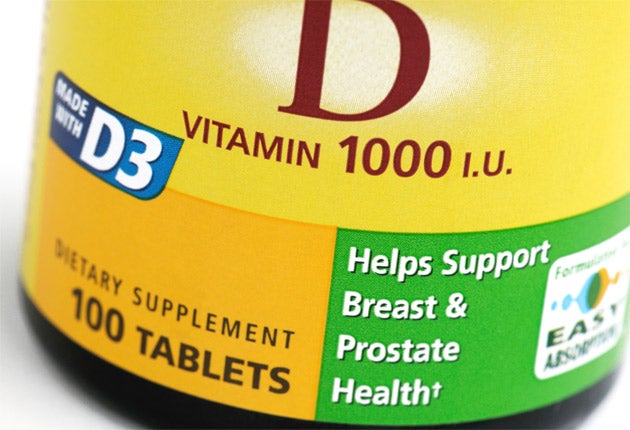Vitamin supplements could reduce risk of Covid in women, researchers say
Health app team warns their results are not backed by clinical trials, only observation

Your support helps us to tell the story
This election is still a dead heat, according to most polls. In a fight with such wafer-thin margins, we need reporters on the ground talking to the people Trump and Harris are courting. Your support allows us to keep sending journalists to the story.
The Independent is trusted by 27 million Americans from across the entire political spectrum every month. Unlike many other quality news outlets, we choose not to lock you out of our reporting and analysis with paywalls. But quality journalism must still be paid for.
Help us keep bring these critical stories to light. Your support makes all the difference.
Taking vitamins could help reduce the risk from Covid-19 to women, researchers say.
Scientists behind a health tracker app said supplements could have a small downward impact on the chances of catching coronavirus – but only for women.
However, the Zoe Covid Symptom Study app team warned that their findings had yet to be backed up by clinical trials, and that the effect they noticed was in any case a small one.
The debate over whether taking a vitamin D supplement reduces the risk of Covid-19 has raged for months.
Official studies tracking people's exact levels of vitamin D through blood tests and in-depth questionnaires are currently ongoing.
At the weekend ministers announced that the government would offer 2.7 million vulnerable individuals in England a free winter supply of the pills to counteract reduced time spent outside in the sun.
The Zoe Covid Symptom Study asks participants to input their health status each day.
Early on in the pandemic 1.4 million app users input data about whether or not they used supplements. Among this group more than 445,000 went on to be diagnosed with Covid-19, while 126,000 were thought to have the disease based on their symptoms.
After analysing the data and comparing information between those who had, and had not had Covid-19, the researchers concluded that multivitamins, vitamin D, omega-3, and probiotic supplements all had a very small but statistically significant protective effect.
Vitamin C, zinc or garlic supplements had no detectable effect, they added.
The reduction in risk ranged from up to 9 per cent for vitamin D, 14 per cent for probiotics; 13 per cent for multivitamins and 12 per cent for omega 3.
Dr Cristina Menni, from King's College London and the app's lead researcher, warned that the team could not make strong recommendations.
She added: "Until we have further evidence about the role of supplements from randomised controlled trials, we recommend following the NHS guidelines on vitamins usage as part of a healthy balanced diet."
Professor Tim Spector, also of King's, added: "Spending your money on supplements in the hope of trying to avoid getting Covid-19 is largely unjustified.
"You're better off focusing on getting a healthy diet with diverse fresh vegetables and fruits, which should give you all the nutrients you need for a healthy immune system.”
Prof Spector said it was not clear whether vitamin D would actually help the high-risk groups the government is giving it to.
Other scientists said the findings should be treated with caution.
Naveed Sattar, professor of metabolic medicine at the University of Glasgow, said: "These are interesting results but, due to the way the study has been conducted, these data absolutely cannot tell us that taking such supplements 'protects' against infection from Covid-19."
And Guy Poppy, professor of ecology at the University of Southampton, said: "Whilst this is another interesting finding from the Zoe Covid-Symptom app, one should be cautious about how much one can really infer from this dataset, as recognised by the study authors."
Additional reporting by Press Association
Subscribe to Independent Premium to bookmark this article
Want to bookmark your favourite articles and stories to read or reference later? Start your Independent Premium subscription today.

Join our commenting forum
Join thought-provoking conversations, follow other Independent readers and see their replies
Comments